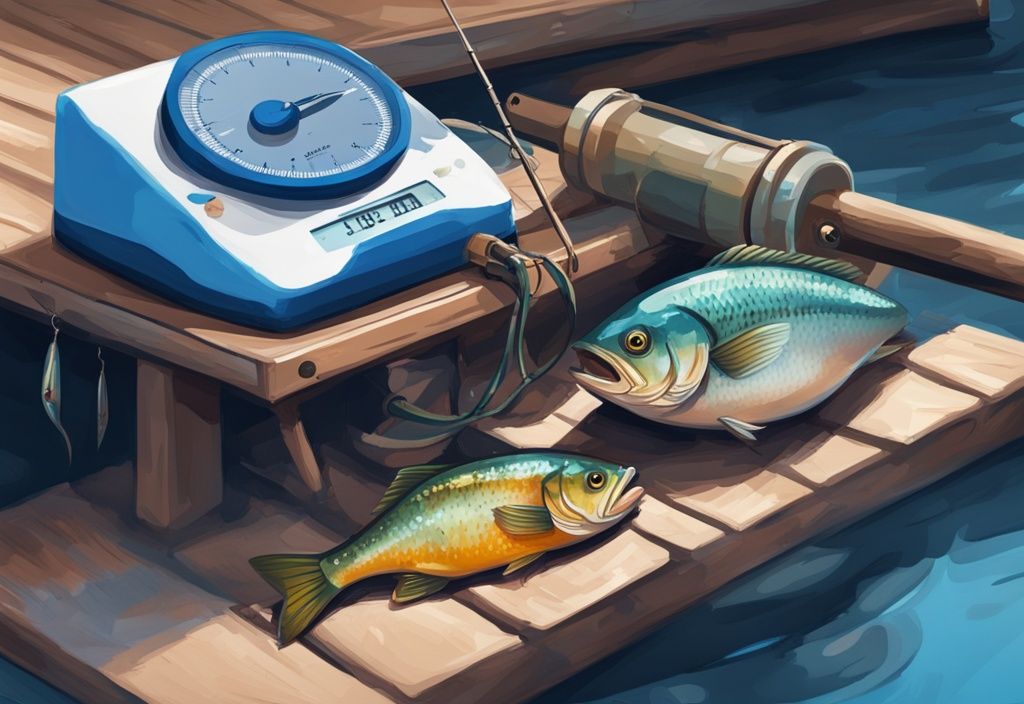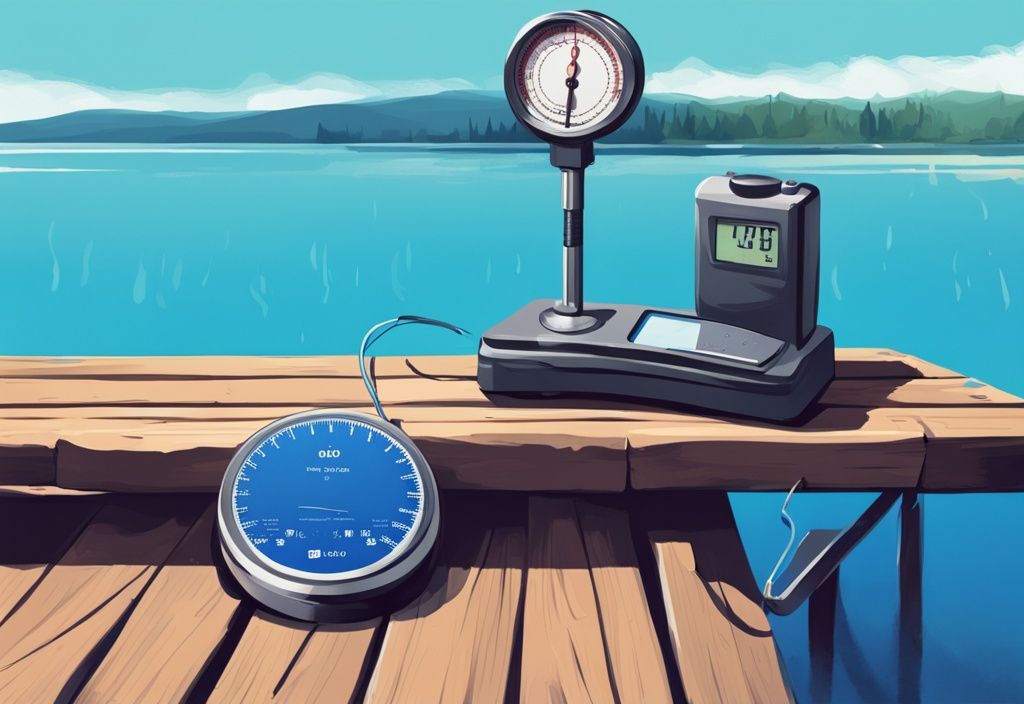Ever found yourself scratching your head at the fishing gear shop, baffled by the array of scales? I’ve been there. It’s a critical decision – digital or analogue fishing scale? It’s not just about getting accurate measurements. The right scale can be a game-changer for your fishing exploits!
This guide dives tremendously into the nitty-gritty of digital and analogue fishing scales. We’ll dissect their differences, analyze their functionalities and get you razor- sharp insights about their features. All aimed to ensure your choice perfectly aligns with your fishing style!
So, why are you here? Looking to gear up for a tournament or just planning a relaxed fishing weekend? Either way, lean on this guide and choose confidently. Let’s reel in that big catch together!
An Overview of Digital and Analogue Fishing Scales
If you’ve spent any time by the water, you’ve likely debated the merits of digital vs. analogue fishing scales. To help you figure out which type fits your style, let’s break down the basics and dive into the pros and cons of each.
Understanding the Basics of a Fishing Scale
Fishing scales are essential tools employed by anglers to measure the weight of their catches. These devices play a critical role, especially in competitive fishing, where accurate weight verification is necessary. Primarily, fishing scales are categorized into two types: digital and analogue (mechanical or spring) scales.
Analogue fishing scales operate using a spring mechanism that measures weight and displays the result via a needle on a dial. In contrast, digital fishing scales employ electronic sensors to calculate the weight, presenting the data on an LCD or LED screen. Each type offers distinct advantages and potential drawbacks, making them suitable for different fishing needs and scenarios.
Analogue vs Digital Fishing Scales: Which reigns supreme?
The debate of digital vs. analogue fishing scale centers around functionality and user preferences.
Analogue scales have garnered a reputation for their long-standing reliability and simplicity. Known for their durability, these scales excel in outdoor conditions without the need for electronic components. They offer a straightforward, mechanical design that eliminates dependency on batteries, making them consistently dependable.
In contrast, digital fishing scales are celebrated for their high precision and assortment of modern features. These scales can show weight in finer increments, making them ideal for anglers requiring exact measurements. Additionally, digital scales often come with various functionalities such as memory storage, tare functions, and unit conversions, greatly enhancing their utility. However, they require careful battery management, which can be a limitation, especially in prolonged, remote fishing trips.
When choosing between a digital vs. analogue fishing scale, an angler’s decision is influenced by their specific requirements, experience level, and the fishing scenario they anticipate. Accurate measurements play a vital role in fishing, whether for complying with regulations or keeping records; for more insights, check out this article on how to enhance your fishing experience with a fish ruler for your boat. Enhance your fishing experience with a fish ruler for your boat. Analogue scales might be more appropriate for recreational fishing or when simplicity and reliability are paramount. Conversely, digital scales are better suited for competitive fishing where precision and advanced features are crucial. The optimal choice ultimately hinges on individual needs and the context of the fishing activity.

Analogue Fishing Scales: A Closer Look
The Fundamentals of Analogue Fishing Scales
There’s something reassuringly old-school about analogue fishing scales. Essentially, they run on a simple spring mechanism that’s been around for generations. When you hook your catch, the spring compresses and the needle on the dial moves to indicate the weight. It’s a purely mechanical design, free of any electronic fuss, which means it’s the kind of kit you can rely on in any weather—no batteries needed. Just you, your fish, and the reassuring click of that needle.
Pros and Cons of Analogue Fishing Scales
Why Analogue Scales Still Retain Their Popularity
Analogue fishing scales have stuck around in tackle boxes for quite a few good reasons. To start, you never have to stress about your batteries dying when you’re miles from the nearest power source. These trusty scales are celebrated for their consistency and dependability, making them a long-time favorite among many anglers. Plus, they’re incredibly straightforward—no need to fuss with settings or worry about electronics. Pull your scale out and you’re ready to weigh; it’s just that simple. This ease of use means less time fiddling and more time fishing.
The Possible Drawbacks of Using an Analogue Scale
But let’s be honest—analogue scales aren’t perfect. They often fall short in the precision department compared to digital models. When you’re weighing a fish, the measurements typically come in larger increments, like 1/4 to 1/2 pound, which might not cut it if you’re after pinpoint accuracy. Reading the dial can also be a challenge in low light, making those early morning or late evening fishing trips a bit tricky. The mechanical parts are another concern; they’re prone to rust and wear from constant exposure to water and tough weather conditions. Regular upkeep is essential to keep them in tip-top shape.
Digital Fishing Scales: The High-Tech Choice
What Sets Digital Fishing Scales Apart?
Let’s dive right into what makes digital fishing scales the tech-savvy angler’s best friend. Unlike their analogue cousins, digital fishing scales use advanced electronic sensors that capture the exact weight of a fish and display this on a bright, easy-to-read LCD or LED screen. Gone are the days of squinting at tiny mechanical movements! This electronic conversion means you get a super accurate reading, down to the gram or ounce. It’s like having a tiny scientist in your tackle box, meticulously measuring your catch. For those looking to enhance their fishing experience, check out our guide on the best 5 fishing lines for spinning reels. With such precision, every angler aiming for those record-breaking catches will find digital scales an indispensable tool. Trust me, this high-tech functionality can give you an edge, ensuring not just reliability but also a more exciting and satisfying fishing experience.
Advantages and Disadvantages of Digital Fishing Scales
Modern Features of Digital Scales That Enhance Accuracy and Convenience
One of the things I love about digital fishing scales is their sheer level of practicality and accuracy, packed with modern features that can transform your fishing trips. For starters, many have memory storage—think of it as your digital fishing journal, logging your prized catches over time. How cool is that?
Then there’s the tare function, which lets you subtract the weight of containers or nets from the total, ensuring you’re getting the precise weight of your fish. Talk about attention to detail! Plus, most digital scales offer unit conversion, seamlessly switching between pounds, ounces, and kilograms. Handy for those of us fishing in international waters or simply preferring different measurements.
And if you’re into tech, some of these scales can even sync with your mobile apps. Imagine tracking and analyzing your fishing habits right from your smartphone. It’s like merging fishing with a virtual assistant!
Don’t let the night or weather dampen your fishing spirit either. With backlit screens, you’ll have clear visibility of your measurements, rain or shine, dawn till dusk. That way, no catch goes undocumented, regardless of the conditions.
Downsides of the Digital Fishing Scales You Should be Aware of
Now, before you dash out to get one, it’s only fair to mention that digital fishing scales do have their quirks. First up, they need batteries. Yes, the dreaded battery life issue! Just imagine being on the brink of measuring your catch of the day, only to find your scale blinking out. Keeping spare batteries and remembering to charge them can be a bit of a chore, but it’s a small price to pay for precision, don’t you think?
Another thing to watch out for is their electronic nature. Digital scales are a bit more delicate compared to rugged analogue ones. They’re susceptible to harsh weather conditions. Too much humidity, a splash of water, or an extreme temperature drop, and your scale might start acting up or fail completely. Not ideal when you’re out in the elements.

Regular maintenance is a must. Protect your gear from rough weather, replace batteries occasionally, and handle it with care. Treat your digital scale well, and it’ll serve you reliably on countless fishing adventures.
Head to Head Comparison: Digital vs. Analogue Fishing Scales
There’s a lot to consider when choosing between digital and analogue fishing scales. Whether it’s precision, durability, user-friendliness, battery life, or added features, each type of scale has distinct advantages and limitations.
Let’s dive in and weigh (pun intended) the options.
Precision and Accuracy
Digital fishing scales are often celebrated for their pinpoint precision, ideal for anglers looking to capture exact measurements down to the smallest increments. With electronic sensors, these scales deliver precise weight readings, usually to the nearest decimal. This accuracy can be a game-changer in competitive fishing, where every ounce is crucial. Analogue fishing scales, operating on a spring mechanism, offer simpler but less precise readouts, typically in increments like 1/4 or 1/2 pounds. While they may not match the precision of their digital counterparts, they’re perfectly adequate for casual fishing activities where exact weight isn’t critical.
Durability and Resistance to Elements
Analogue fishing scales shine in terms of durability and resistance to environmental elements. Their mechanical design allows them to brave harsh weather conditions and withstand rough handling. With no electronic parts, there’s a lower risk of them malfunctioning from exposure to water, humidity, or dirt. Digital fishing scales, although highly functional, can be more vulnerable to environmental damage. Corrosion and electronic malfunctions are potential issues, especially if exposed to extreme weather or water. Proper care and maintenance can, however, prolong their lifespan in challenging outdoor environments.
User-friendliness and Portability
When it comes to user-friendliness, analogue fishing scales are a breeze to use. No need for batteries or charging—just a straightforward mechanism that’s always ready to go. This reliability is golden, particularly on remote fishing trips where power sources are scarce. Digital fishing scales, while slightly more reliant on electronic components, pack in advanced features for the tech-savvy angler. Think tare weight adjustments, memory storage, and unit conversions, all aimed at enriching your user experience beyond mere weight measurement.
Battery Life and Dependability
Battery life is a key factor in the digital vs. analogue fishing scale debate. Digital fishing scales are battery-powered, which means you might face unexpected battery deaths or frequent replacements. This can be a hassle, especially on extended trips. Analogue scales, however, require no batteries, ensuring dependable performance every time you use them. This battery-free operation eliminates the stress of sudden power failure, making them a reliable choice for anglers who value consistency and readiness.
Comparing Additional Features and Functionality
In the realm of additional features and functionality, digital fishing scales are the frontrunners. These high-tech devices often come equipped with modern perks like data storage, app connectivity for fish management systems, and backlit screens, making it easier to read in low-light conditions. These features are invaluable for serious anglers who meticulously record and analyze their catches. On the flip side, analogue fishing scales focus on core weight measurement functionality. Their simplicity translates to fewer features but also fewer potential points of failure, appealing to those who prefer robust, uncomplicated tools.
Picking the Perfect Fishing Scale: Factors to Consider
Choosing Based on Your Fishing Style
When it comes to selecting between a digital vs. analogue fishing scale, your fishing style is a game-changer. If you’re a tournament angler, precision and extra features are your best friends. Digital scales, with their pinpoint accuracy, memory storage, and tare functions, can be a real boon during those high-stakes moments.
By contrast, if you’re more of a laid-back, recreational angler or someone who enjoys fishing in off-the-grid locations, an analogue scale might be your trusty companion. Their no-nonsense simplicity, unyielding reliability, and zero reliance on batteries make them ideal in rugged conditions where an electronic device might let you down. Analogue scales are built tough, enduring harsh environments while delivering steady performance without needing much upkeep.
How Your Budget Affects Your Choices
Thinking about your budget is inevitable when weighing the pros and cons of a digital vs. analogue fishing scale. Digital scales often come with a heftier price tag due to their advanced features and technology integrations. The precise measurements, unit conversions, and even app connectivity they offer can justify the extra cost for many anglers.
On the flip side, analogue scales are generally easier on the wallet. Thanks to their mechanical design and lack of electronic components, they cost less to produce and purchase. For anglers who are budget-conscious, an analogue scale can be a dependable, cost-effective option for weighing their catches.
Personal Preference and Its Role in Selection
Ultimately, personal preference is key when choosing between a digital vs. analogue fishing scale. Some folks love the straightforwardness and durability of analogue scales. The peace of mind knowing they won’t face electronic failures or battery issues is a huge plus.
Others, however, might lean towards the high precision and modern conveniences of digital scales. Features like backlit screens for those dawn or dusk fishing trips, data storage, and connectivity options can significantly enhance the fishing experience. For tech-savvy anglers, digital scales might just hit the sweet spot.

Your past experiences and comfort levels with each type of scale matter too. Weigh your needs and preferences carefully; the right scale can amplify your fishing adventures, be it a digital or an analogue one.
Conclusion: Analogue or Digital – The Final Verdict
When it comes to choosing between a digital vs. analogue fishing scale, each has its own charm and practicality.
Accuracy: Digital fishing scales are celebrated for their razor-sharp precision, often showing weight in tiny increments. This accuracy is gold for tournament anglers needing to spot minute weight differences. On the flip side, analogue scales employ a spring mechanism, providing a straightforward readout that, while trustworthy, is less exact and generally comes in larger increments.
Durability: Picture this: you’re out on the lake, and your gear gets a bit of a soaking. Analogue fishing scales are champions in such conditions. Their mechanical nature makes them more resilient against water and dirt, and they’re simpler, reducing the risk of malfunction. In contrast, digital scales can be temperamental with battery issues and sensitivity to moisture and extreme temperatures.
Ease of Use: For sheer simplicity, analogue scales are hard to beat. They’re ever-ready, no batteries or fiddly electronics needed. Just throw them in your tackle box and go. Digital scales, while requiring a bit more attention to battery life and electronic integrity, offer handy features like backlit screens, memory functions, and unit conversions.
Type of Fishing Activity: Your fishing style can significantly tilt the scale (pun intended). Competitive anglers love the precision and extra features of digital scales. But if you’re a laid-back fisher or often find yourself in remote spots, analogue scales’ reliability stands out. No battery glitches, just consistent performance.
Ultimately, the choice between a digital vs. analogue fishing scale boils down to personal preference. Digital scales bring modern flair and high precision, perfect for meticulously tracking catches in competitive settings. Analogue scales, with their robustness and ease-of-use, cater to those who value dependability and simplicity.
Think about your specific fishing needs, the challenges you typically face, and how crucial detailed measurements are for you. Then make your pick based on what truly matters for your fishing adventures.
FAQ
Digital vs Analogue Fishing Scale
Digital vs Analogue Fishing Scale: Which is More Accurate?
Digital scales, hands down, score higher on accuracy. They present weight in finer increments than their analogue counterparts. This precision can be crucial when you’re logging those big catches and want to be as exact as possible.
How Durable Are Digital Fishing Scales?
While digital scales bring precision, they take a hit on durability. They’re more susceptible to the whims of Mother Nature, including water and harsh weather. So, they demand a bit more TLC – think of them as the divas of fishing gear.
Why Should Anglers Consider an Analogue Fishing Scale?
Analogue scales, in contrast, are the rugged, no-fuss friends you can always count on. No need for batteries, just pure mechanical reliability. Come rain or shine, they’ve got your back and consistently deliver, making them great companions on any fishing adventure.
Can Digital Fishing Scales Withstand All Weather Conditions?
Unfortunately, digital scales aren’t always up to the challenge when it comes to all-weather resilience. They can get finicky with water and other environmental factors. While some models offer water resistance, you’ll generally find analogue scales to be sturdier and more weatherproof.


